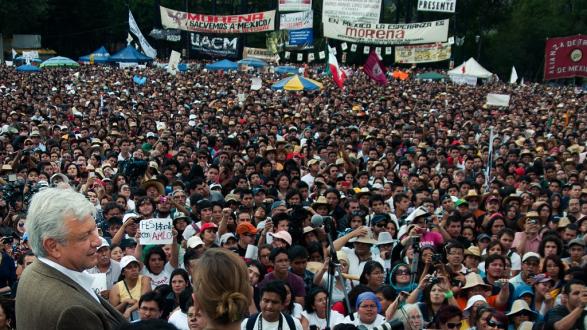"People don’t always choose a president by analyzing how the economy has grown, but on what their personal life experience has been," Dr. Viridiana Rios told Pacific Council members in the second installment of the Summer Teleconference Series on Mexico’s recent election. And the life experience of Mexicans isn’t completely positive: about 70 percent of Mexicans believe their economic situation is getting worse every year.
The teleconference was co-presented by the Mexican Council on Foreign Relations (COMEXI). In addition to Rios, lecturer of public policy at Harvard University and global fellow at the Mexico Institute at the Wilson Center, the call also featured Dr. Luis Rubio, chairman of COMEXI, and was moderated by Dr. Andrew Selee, president of the Migration Policy Institute.
The July 1 elections in Mexico gave way to an historic win by President-elect Andrés Manuel López Obrador, popularly known as AMLO. His win ushered in a "new era in Mexican politics," according to Rios. He won 31 out of 32 states, and his coalition won both houses of Congress.
"Now that he’s no longer a candidate, he will have to focus on how to get things done. He has to find a way to deliver on what he promised."
Luis Rubios
So what does this mean for the future of Mexico? What challenges does AMLO face as he takes office?
Rubio and Rios both pointed to three challenges AMLO must address: inequality, violence, and corruption. In that regard, AMLO has made it that clear he is serious about confronting these issues, but Rubio noted that it is not going to be easy.
"Now that he’s no longer a candidate, he will have to focus on how to get things done," said Rubio. "He has to find a way to deliver on what he promised."
Rios noted that in order to face these three challenges, AMLO will have to recreate the system which he ran his campaign against. Rios said she sees great hope in Mexican citizens about the future of AMLO’s presidency, but also "a lot of naiveté about how hard AMLO will have it."
There are many questions about the future of U.S.-Mexico relations, Selee noted, so what will that relationship look like? How will AMLO work with Trump?
"The best way [for AMLO] to approach Trump is to develop Mexico in order to make the Mexican economy less dependent on what is happening in the north."
Viridiana Rios
During the presidential debates, AMLO was the one candidate who had the least to say about Trump, Rios pointed out. Every time he has spoken about the United States, he has remained respectful and cautious.
"He tends to be more focused on domestic development," Rios said. "The best way to approach Trump is to develop Mexico in order to make the Mexican economy less dependent on what is happening in the north."
By addressing the three challenges of inequality, corruption, and violence, Mexico will find itself relying less on the United States.
"Domestic policy is the best foreign policy," Rubio said.
But U.S.-Mexico relations have been tense since President Trump took office, and Selee wondered if the AMLO-Trump relationship will be about peace or antagonism.
"When I look at López Obrador, I see someone who understands the relationship between Mexico and the United States and he will need to be very cautious to keep that relationship going," Rios said.
"Problems with NAFTA lie not with Mexico or with Canada for that matter, but with the United States, and that’s not likely to change."
Michael Camuñez
Pacific Council Director Michael Camuñez, who also chairs the Council’s Mexico Initiative, added that he doesn’t expect "a fundamental shift in Mexican foreign policy toward the United States," but if Trump continues harsh rhetoric towards Mexican immigrants, AMLO will be forceful in his response.
Panelists also discussed the role of NAFTA in future U.S.-Mexico relations. There is a sense of relief about AMLO’s support for NAFTA, but Camuñez added that it’s not AMLO who will dictate the future of the trade agreement.
"Problems with NAFTA lie not with Mexico or with Canada for that matter, but with the United States, and that’s not likely to change," he said.
For now, though, there doesn’t seem to be too much tension between the two leaders, despite consistent battles over trade and immigration.
"Trump clearly seems to like strongmen, people he perceives to be powerful," Camuñez said. "That bodes well for AMLO."
Listen to the full conversation below:
_______________________
Learn more about our Mexico Initiative.
The views and opinions expressed here are those of the speakers and do not necessarily reflect the official policy or position of the Pacific Council.




